Events
Past Event
CS Distinguished Lecture: Cryptography in the "Post-AI" Era: Machine Learning attacks on Post-Quantum Cryptography (Kristin Lauter)
Department of Computer Science (CS)
12:00 PM
//
3514, Mudd Hall ( formerly Seeley G. Mudd Library)
Details
Monday / CS Distinguished Lecture
November 4th / 12:00 PM
Hybrid / Mudd 3514
Speaker
Dr. Kristin Lauter, FAIR Labs North America
Talk Title
Cryptography in the "Post-AI" Era: Machine Learning attacks on Post-Quantum Cryptography
Abstract
AI is taking off and we could say we are living in “the AI Era”. Progress in AI today is based on mathematics and statistics under the covers of machine learning models. This talk will explain at a high level how these techniques work, and some important applications. In particular, I will explain recent work on AI4Crypto, where we train AI models to attack Post Quantum Cryptography (PQC) schemes based on lattices. Understanding the concrete security of these standardized PQC schemes is important for the future of e-commerce and internet security. So in addition to living in a Post-Quantum era, we can say we are living in a “Post-AI” era.
Biography
"Dr. Kristin Lauter is Senior Director of FAIR Labs North America (2022—present), based in Seattle. Her current research areas are AI4Crypto and Private AI. She joined FAIR (Facebook AI Research) in 2021, after 22 years at Microsoft Research (MSR). At MSR she was Partner Research Manager on the senior leadership team of MSR Redmond. Before joining Microsoft in 1999, she was Hildebrandt Assistant Professor of Mathematics at the University of Michigan (1996-1999). She is an Affiliate Professor of Mathematics at the University of Washington (2008—present). She received all her advanced degrees from the University of Chicago, BA (1990), MS (1991), PhD (1996) in Mathematics. She is best known for her work on Elliptic Curve Cryptography, Supersingular Isogeny Graphs in Cryptography, Homomorphic Encryption (SEALcrypto.org), Private AI, and AI4Crypto. She served as President of the Association for Women in Mathematics from 2015-2017 and on the Council of the American Mathematical Society from 2014-2017.
Lauter has been recognized for her mathematical research and leadership with numerous awards: the Selfridge Prize in Computational Number Theory (2008), as an elected Fellow of the American Mathematical Society (2015), Fellow of the Association for Women in Mathematics (2017), Fellow of the Society for Industrial and Applied Mathematics (SIAM) in 2020, and Fellow of the American Association for the Advancement of Science (2020). In 2021, Lauter was elected as an honorary member of the Royal Spanish Mathematical Society (RSME). She was awarded the Pólya Lectureship for the Mathematical Association of America (2018–2020) and the SIAM Block Community Prize Lecturer in 2022. She gave a TED talk on Private AI at Congreso Futuro in 2020 and on AI4Crypto in 2023."
Research/Interest Areas:
AI Privacy and Security, AI for Math, Cryptography, Number Theory
---
Zoom: https://northwestern.zoom.us/j/91596979165
Panopto: https://northwestern.hosted.panopto.com/Panopto/Pages/Viewer.aspx?id=8e7fb621-a6a1-4802-ae58-b2140108a4a6
DEI Minute: Disability and Accessibility https://tinyurl.com/cspac-dei-minute
Time
Monday, November 4, 2024 at 12:00 PM - 1:00 PM
Location
3514, Mudd Hall ( formerly Seeley G. Mudd Library) Map
Contact
Calendar
Department of Computer Science (CS)
"AI in the Judiciary" - U.S. District Court Judge Xavier Rodriguez
Northwestern Network for Collaborative Intelligence (NNCI)
12:15 PM
//
Thorne Auditorium, Arthur Rubloff Building
Details
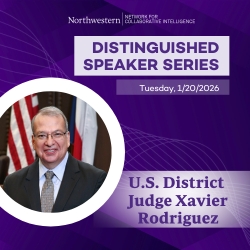
Join us for an in-person Distinguished Speaker event, co-hosted with the Law and Technology Initiative at Pritzker School of Law and McCormick School of Engineering, featuring U.S. District Court Judge Xavier Rodriguez.
Location: Thorne Auditorium, Pritzker School of Law, Chicago Campus
Lunch will be provided. Registration is required.
Time
Tuesday, January 20, 2026 at 12:15 PM - 1:30 PM
Location
Thorne Auditorium, Arthur Rubloff Building Map
Calendar
Northwestern Network for Collaborative Intelligence (NNCI)
"AI & The Future of News" - Featuring Emily Withrow, Larry Birnbaum, Nick Diakopoulos, & Jeremy Gilbert
Northwestern Network for Collaborative Intelligence (NNCI)
12:00 PM
//
Ruan Conference Room, Chambers Hall
Details
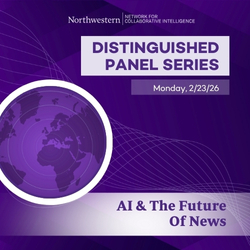
Join us for an in-person Distinguished Panel event featuring Emily Withrow (NY Times), Larry Birnbaum, and Nick Diakopoulos, moderated by Jeremy Gilbert.
Title: "AI & The Future of News"
AI is dramatically altering not only the way news is reported but also how audiences encounter and consume information. Journalists currently use AI for everything from analyzing imagery and generating graphics to proofreading articles, suggesting headlines, and monitoring their beat for new stories. As newsrooms adopt these tools to support content production and dissemination, they must also navigate ethical boundaries and responsible use. Meanwhile, malign actors are deploying deepfakes and generative models to spread disinformation and AI slop, increasing the verification workload on journalists. Join our Distinguished Panel to learn more about how AI is reshaping the future of news!
Lunch will be provided. Registration is required.
Time
Monday, February 2, 2026 at 12:00 PM - 1:30 PM
Location
Ruan Conference Room, Chambers Hall Map
Calendar
Northwestern Network for Collaborative Intelligence (NNCI)
"Generative AI for Molecules & Materials" - Featuring Julius Lucks, Chris Wolverton, Chris Schuh
Northwestern Network for Collaborative Intelligence (NNCI)
12:00 PM
//
Ruan Conference Room, Chambers Hall
Details
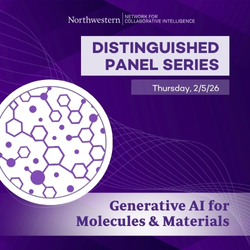
Join us for an in-person Distinguished Panel event featuring Julius Lucks, Chris Wolverton, moderated by Chris Schuh.
Title: "Generative AI for Molecules & Materials"
Since the award of the 2024 Nobel Prize in Chemistry, AI is no longer a theoretical tool. AlphaFold and its successors are now being used to rapidly identify disease targets, create novel molecules, and predict drug properties (like toxicity and effectiveness), significantly faster and cheaper than before. Likewise, Gnome and its successors are now reshaping the landscape of materials design, allowing designers to specify function first and then generate potential structures, dramatically speeding up discovery. Join our Distinguished Panel to learn how AI is reshaping the synthesis of materials, molecules, and drugs!
Lunch will be provided. Registration is required.
Time
Thursday, February 5, 2026 at 12:00 PM - 1:30 PM
Location
Ruan Conference Room, Chambers Hall Map
Calendar
Northwestern Network for Collaborative Intelligence (NNCI)
"Big-Data Algorithms That Are Not Machine Learning" - Jeffrey Ullman
Northwestern Network for Collaborative Intelligence (NNCI)
12:00 PM
//
3514, Mudd Hall ( formerly Seeley G. Mudd Library)
Details
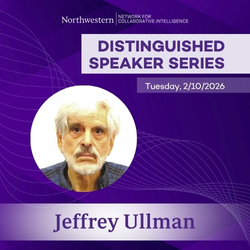
Join us for an in-person Distinguished Speaker event featuring Jeffrey Ullman, a prominent figure in computer science whose contributions have shaped the foundations of algorithms, databases, and theoretical computing.
Title: "Big-Data Algorithms That Are Not Machine Learning"
Abstract: We shall introduce four algorithms that run very fast on large amounts of data, although typically the answers they give are approximate rather than precise. (1) Locality-sensitive hashing (2) Approximate counting (3) Sampling (4) Counting triangles in graphs.
Lunch will be provided. Registration is required.
Jeff Ullman is the Stanford W. Ascherman Professor of Engineering (Emeritus) in the Department of Computer Science at Stanford and CEO of Gradiance Corp. He received the B.S. degree from Columbia University in 1963 and the PhD from Princeton in 1966. Prior to his appointment at Stanford in 1979, he was a member of the technical staff of Bell Laboratories from 1966-1969, and on the faculty of Princeton University between 1969 and 1979. From 1990-1994, he was chair of the Stanford Computer Science Department. Ullman was elected to the National Academy of Engineering in 1989, the American Academy of Arts and Sciences in 2012, the National Academy of Sciences in 2020, and has held Guggenheim and Einstein Fellowships. He has received the Sigmod Contributions Award (1996), the ACM Karl V. Karlstrom Outstanding Educator Award (1998), the Knuth Prize (2000), the Sigmod E. F. Codd Innovations award (2006), the IEEE von Neumann medal (2010), the NEC C&C Foundation Prize (2017), and the ACM A.M. Turing Award (2020). He is the author of 16 books, including books on database systems, data mining, compilers, automata theory, and algorithms.
Time
Tuesday, February 10, 2026 at 12:00 PM - 1:30 PM
Location
3514, Mudd Hall ( formerly Seeley G. Mudd Library) Map
Contact
Calendar
Northwestern Network for Collaborative Intelligence (NNCI)
"Fun with Fashion" - Larry Davis
Northwestern Network for Collaborative Intelligence (NNCI)
12:00 PM
//
Guild Lounge, Scott Hall
Details
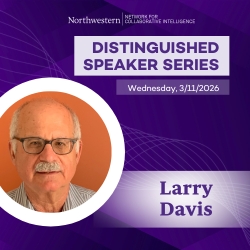
Join us for an in-person Distinguished Speaker event featuring Larry Davis, a leading figure in computer vision and artificial intelligence whose influential academic career and recent industry innovations at Amazon have helped shape modern approaches to visual understanding and generative media.
Title: "Fun with Fashion"
Abstract: More than 100,000,000 customers shop for clothing online at Amazon annually in the United States alone. The fashion catalogue is enormous and changes with high velocity as new styles are introduced and older items either go out of fashion or out of stock. Customers are challenged to find clothing that fits their style and their bodies at a price that fits their budgets. The Amazon Fashion science team addresses these challenges through the design and development of new machine learning and computer vision models that help customers navigate the catalog and efficiently evaluate items Amazon is recommending to them. The talk will discuss solutions the team has developed to problems including virtual try on (what will this garment look like on me?), complementary recommendations (how do I style this garment?) and size recommendations (what size, if any, of this garment will fit me?), emphasizing the challenges introduced by the need to have scalable solutions.
Lunch will be provided. Registration is required.
Larry Davis is a Senior Principal Scientist in Amazon’s Fashion and Fitness organization. He joined Amazon in 2018 after a long career in academics. At Amazon he worked on introducing novel customer experiences for fashion shopping like outfit builder (based on complementary recommendations) and virtual try on. He led Amazon’s first GenAI team for image and video synthesis, developing models to diversify the catalogue to make it more relatable for our customers. . He received his Ph. D. from the University of Maryland in 1975 and from 1977-1981 was an Assistant Professor of Computer Science at the University of Texas in Austin. He returned to the University of Maryland in 1981 and was the founding Director of the University’s Institute for Advanced Computer Studies (1985-1994). He also served as Chair of the Department of Computer Science from 2000-2012. Larry retired from the University in 2021 and is now a Professor Emeritus and a College Park Professor. He advised more than 75 Ph. D. students at Texas and Maryland. His work spanned many aspects of computer vision, including applications in visual navigation, robotic vision, media forensics, remote sensing,fashion and fundamental problems of object detection and activity recognition. He is a Fellow of both the IEEE and the ACM.
Time
Wednesday, March 11, 2026 at 12:00 PM - 1:30 PM
Location
Guild Lounge, Scott Hall Map
Calendar
Northwestern Network for Collaborative Intelligence (NNCI)
